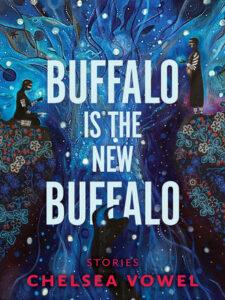
This is a collection of Métis futurism stories that rejects the concept that "education is the new buffalo" and instead imagines how Métis worldviews have survived colonialism in the past and present, and how they can influence the future.
I'll be perfectly honest and say I do not feel qualified to discuss this book, but I thought it was a fantastic and fascinating read that I want a lot more people to pick up, so I'm going to give it a try. First, some background. Indigenous futurisms is a concept inspired by Afrofuturism. As Vowell explains, they "seek to discover the impact of colonization, remove its psychological baggage, and recover ancestral traditions."
Despite the name, it's not just located in the future - which is to say that although some of these stories are science fiction, Indigenous futurisms (and Afrofuturism) doesn't neatly fit into that box. This collection also includes alternative histories, for instance. It's also necessarily political: "whenever we try to envision a world without war, without violence, without prisons, without capitalism, we are engaging in speculative fiction. All organizing is science fiction" ( Walidah Imarisha).
Vowell writes in her introduction that she recognizes Indigenous people exist across the globe, all with their own distinct stories and viewpoints, so she labels her work as specifically Métis futurist, with all the stories taking place around her home of Lac Ste. Anne.
She also discusses how the history of the science fiction genre is intertwined with colonialism, reflecting settler-colonial anxieties and posing colonialism as inevitable, that the only choice is whether to be the colonizer or the colonized.
Vowell also explains that these stories are meant to inspire action. They "invite the reader to co-constitute potentialities with [the author]" and "You don't have to be Métis to get it! Our past was full of relationships with non-Métis, as is our present, and who knows how much more that web of relationality will expand into the future?"
One of my favourite things about this collection, and something that furthers that goal, is that the stories include footnotes and are each followed by an essay explaining Vowell's thought process behind them: "These explorations expand this work beyond creative writing; I am 'imagining otherwise' in order find a way to 'act otherwise.'" While the stories are fiction, there is a lot of research that went into many of them, and the footnotes explain which parts are based in fact and which were changed.
Of course, this is the Lesbrary, so I wouldn't be here if it wasn't also queer. (Chelsea Vowell also identifies as queer.) At least four of the stories are sapphic, though I recognize that this is applying terms from a completely different cultural context. In several stories, it's just mentioned in passing that the main character is attracted to women, but in others, the character's queerness is more central to the story.
In "Buffalo Bird," the main character and her mother are rougarou, shapeshifters who transform into powerful black mares, and that shift is usually through anger. Angelique and her mother are both criticized for not being sufficiently feminine, especially because Angelique has no interest in marrying a man. Vowell explains that these gender norms and this heterosexism have been enforced through colonialism and that they have "erased and punished fluid sexual orientations and gender identities that existed pre-Contact."
In another, a queer Indigenous feminist collective co-parent a kid together. And then there's one with this line, about falling for a woman who's also a literal fox: "I swear, I'd have done anything to keep her looking at me like that, even if part of me did feel like she was thinking about eating me up. Maybe especially because of that."
While it's unusual enough to have a short story collection with footnotes and explanatory essays, they also play with form in different ways. One is told as an academic talk. One is the same story told three times: as hint fiction (under 25 words), microfiction (under 300 words), and then as a short story.
Many of them feel like thought experiments. In one, buffalo are returned to the plains - all at once, with herds crashing through Ikea walls. Another takes the concept of Métis as a "forgotten people" to create a culturally rooted Métis superhero who is instantly forgotten by anyone who isn't family - and uses that to sabotage colonialist projects. In another, parents implant their children with nanites that translate all language input into Cree, making them first language Cree speakers who will keep the language alive but will also be unable to learn any other language. One story follows a world where most of the population hibernates until the world heals from its damage, with technology maintained by an Indigenous crew paid with parcels of land - and one plans to use this opportunity for revenge and to determine who wakes up.
This was a thought-provoking and engaging collection, and I really enjoyed reading the essays to see Vowell's inspiration and intentions behind each story. Vowell is also the cohost of the podcast Métis in Space and co-founder of the Métis in Space Land Trust, which has bought back land around Lac Ste. Anne.
I highly recommend this one, and I'm eagerly anticipating whatever Chelsea Vowel writes next.
Content warnings: racism, suicide, drug use and overdose, violence

